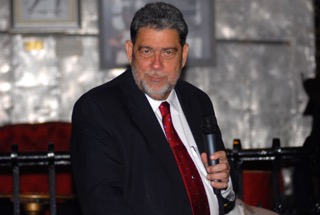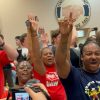By Herb Boyd
Special to IBW
As the longest serving leader in the Caribbean, Prime Minister Ralph E. Gonsalves of St. Vincent and the Grenadines has few reservations about the topics he chooses to discuss and the positions he takes, and that’s why during his recent visit to the states it was interesting to hear his comments on reparations.
“Reparations is one of the critical issues we face today,” he said during a dinner at Bedford Hall last Saturday, sponsored by the Institute of the Black World 21st Century. “It is a huge endeavor and it is a fundamental, defining matter of our age.”
Much of his thinking on reparations was stated in an earlier interview and nowhere is his stand on the issue more definitively discussed than in one of his latest books The Case for Caribbean Reparatory Justice.
“It has been established in international law that ‘reparations must, as far as possible, wipe out all the consequences of the illegal act and reestablish the situations which would, in all probability, have existed if that act had not been committed,’” he wrote. He said that the claim for reparations revolves around three critical points—“the injustice or historic wrong in question must be well-documented; the victims of the injustice or historic wrong must be identifiable as a distinct group; and the current members of the group must continue to suffer the consequences of this injustice or wrong.”
Taking on controversial topics is nothing new for Gonsalves and during the interview he put some of his political activism in perspective, beginning when he was a student in Jamaica at the University of the West Indies at Mona Heights. “I was the president of the student body then and led the massive protest against the government’s banning of Dr. Walter Rodney,” he explained, referring to the legendary Guyanese scholar assassinated in 1980. From that auspicious step he continued his political development as an advocate for the dispossessed Haitians and his unequivocal support for Fidel Castro and the Cuban government.
So it comes as no surprise that during his 14 years in office he has maintained a wide reputation of political integrity and has taken the lead on the call for reparations, emanating from the CARICOM nations. Last year he was the host of a regional conference on reparations and his written one of the major essays on Sir Hilary Beckles’ book Britain’s Black Debt: Reparations for Caribbean Slavery and Native Genocide.
In his praise of the book, Gonsalves took special notice of Beckles’ comments on the WCAR (World Conference Against Racism) a UN sponsored conference in Durban, South Africa in 2001, just before 9/11. The most that delegates from the West, including a large contingent from the U.S., could derive from the meeting was an admission that slavery was a crime against humanity. “It was left to the contingents from the Caribbean, made up of delegates from a few governments and NGOs to keep the fire burning on the reparations issue,” Gonsalves concluded. And there was a subsequent meeting of WCAR in Barbados.
That fire continues to be stoked by Gonsalves and ably abetted by Dr. Ron Daniels and the IBW. Following the dinner, Dr. Daniels told his guests, including Eric Adams, the Borough President of Brooklyn, that the IBW will host the next meeting of the CARICOM Reparations Commission in New York, tentatively “in April 15-19, 2015,” he said. “With this initiative we hope to accelerate the push for reparations in this country.”















